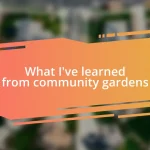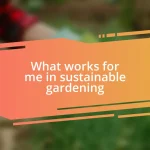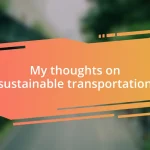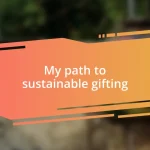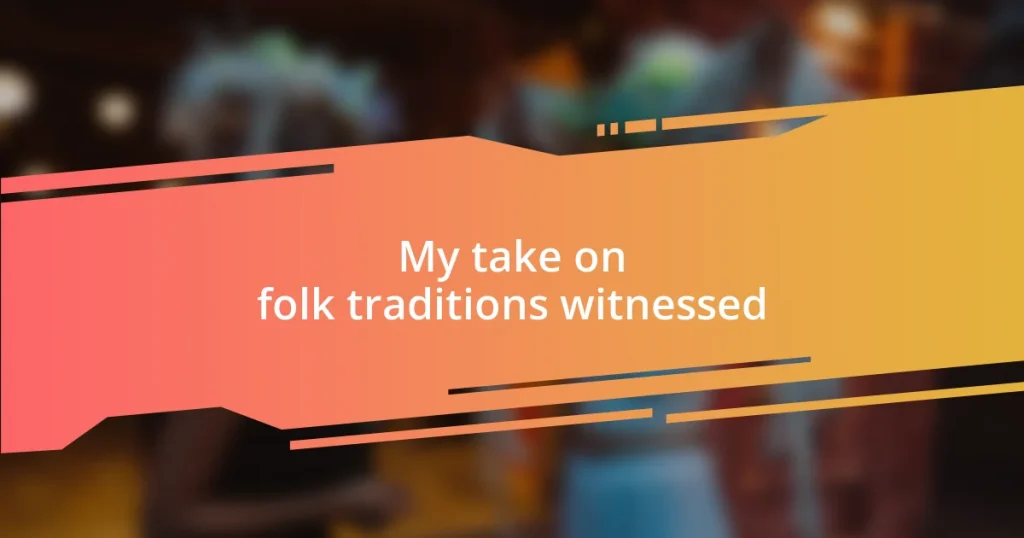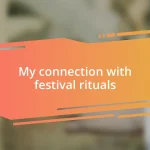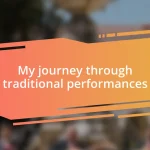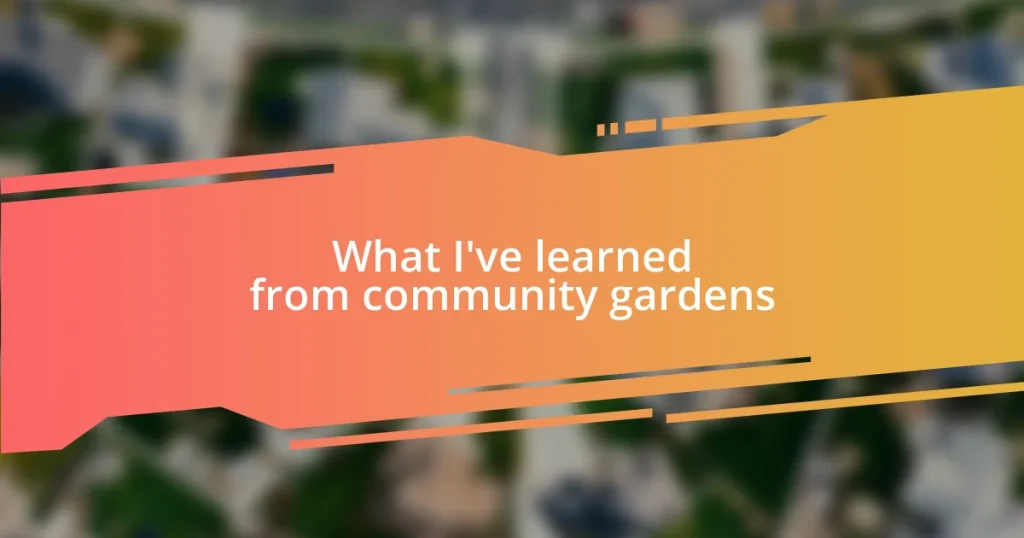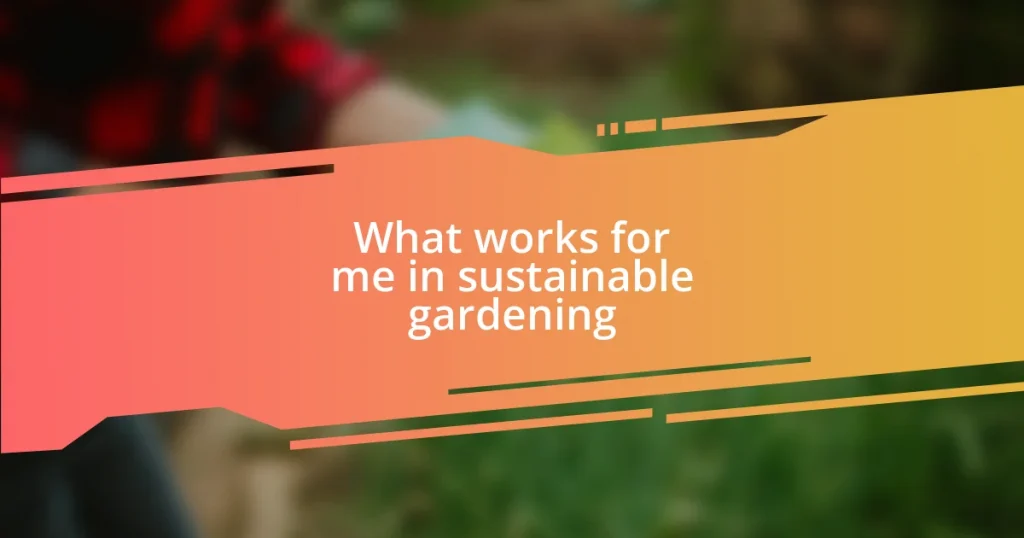Key takeaways:
- Folk traditions connect communities and preserve cultural identity, fostering a sense of belonging and shared history.
- Modernization risks diluting traditional practices, emphasizing the need to balance heritage with contemporary lifestyles.
- Engagement in folk traditions can be enhanced through personal involvement, community gatherings, and education, ensuring their continuation for future generations.
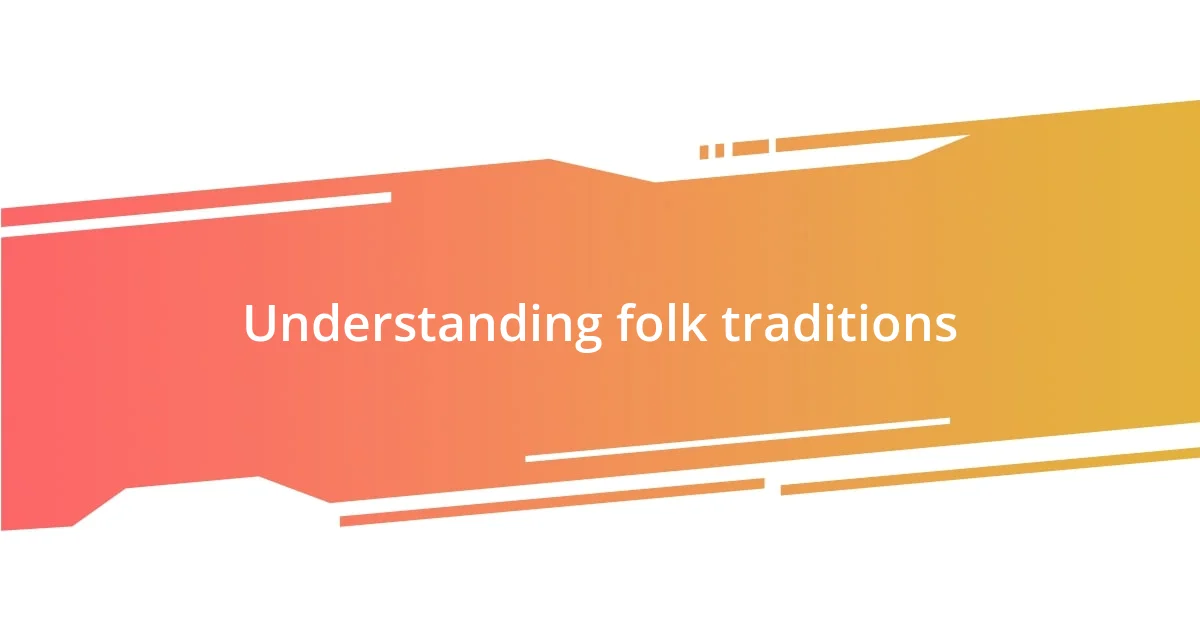
Understanding folk traditions
Folk traditions are like living narratives that connect us to our ancestors. I remember visiting a small village where the locals held a harvest festival, and the way they celebrated with songs and dances made me feel like I was stepping into a storybook. Can you recall a time when a simple tradition brought a community together? It’s fascinating how these rituals preserve history and cultural identity.
Understanding these traditions goes beyond mere observation; it’s about feeling the heartbeat of a community. I once participated in a weaving workshop led by an elderly artisan, and the care she took with each thread spoke volumes about the values passed down through generations. How often do we stop to consider the significance behind such practices and the emotions they evoke?
Each folk tradition carries layers of meaning, often intertwined with the land, seasons, and life cycles. During a winter solstice gathering I attended, the warmth of the fire and the shared stories brought a sense of belonging that’s hard to describe. Have you ever felt that rush of connection in a cultural setting? I find that these moments teach us not just about others but also about ourselves.
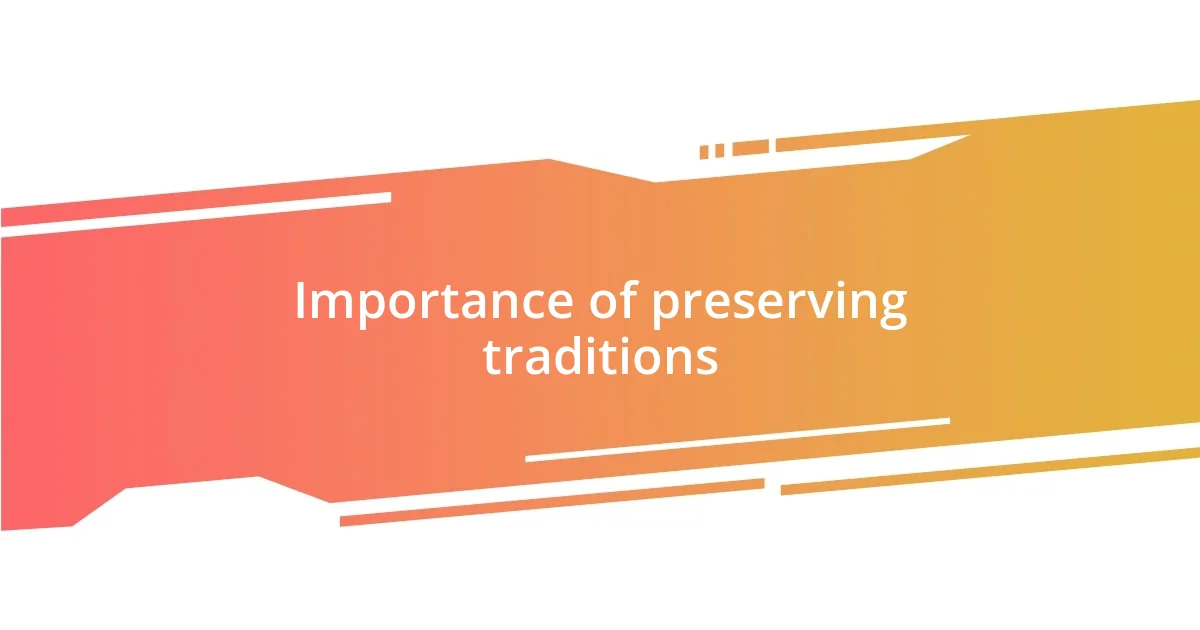
Importance of preserving traditions
Preserving traditions is crucial because they serve as a cultural anchor for communities. I recall a joyful community potluck where each dish told a story of the cooks’ heritage. This sense of shared history can foster stronger bonds among individuals who might otherwise feel disconnected.
Another aspect to consider is how traditions can promote a sense of belonging and identity. I remember celebrating Diwali in a neighborhood filled with diverse cultures. As families lit candles and shared sweets, I felt an overwhelming sense of unity and appreciation for our unique backgrounds coming together in celebration. Isn’t it incredible how traditions can bridge gaps and strengthen our collective identity?
When we maintain our traditions, we keep alive the wisdom and experiences of those before us. A few years ago, I joined a local storytelling circle, where elders shared tales from their youth, rich with lessons that shaped their lives. Each story wasn’t just entertainment; it was a powerful reminder of our roots and the values that define us. How invaluable are these connections to our past in navigating today’s world?
| Importance of Preserving Traditions | Examples |
|---|---|
| Cultural Identity | Community potlucks fostering shared heritage |
| Sense of Belonging | Diverse celebrations like Diwali uniting cultures |
| Wisdom Preservation | Storytelling circles sharing life lessons |
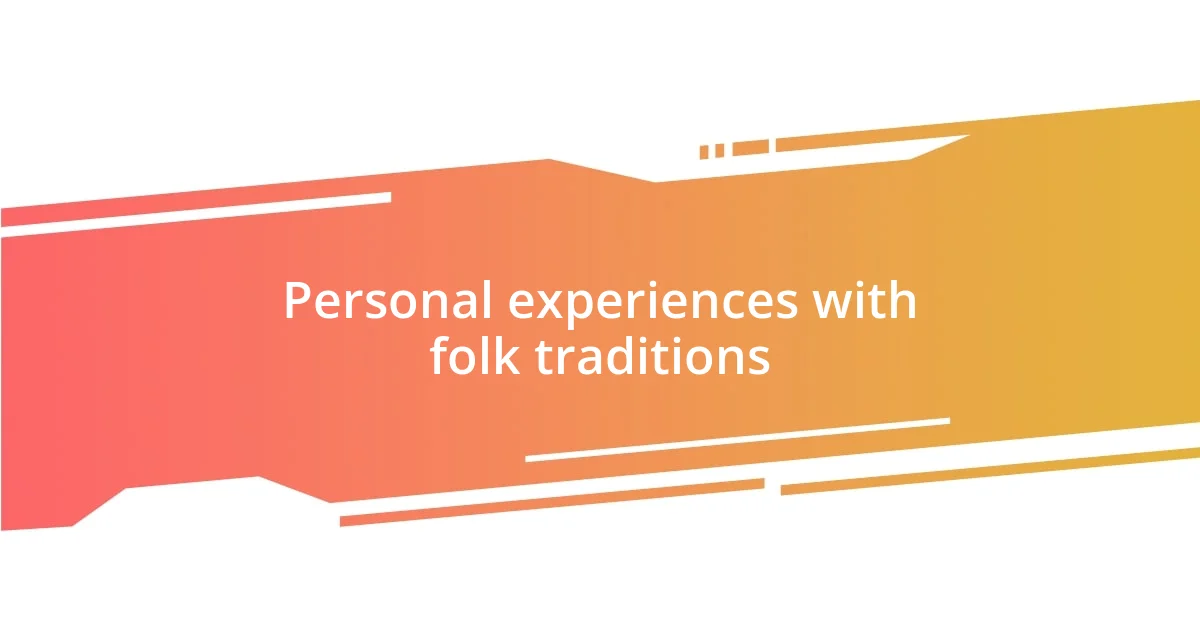
Personal experiences with folk traditions
Participating in folk traditions has often felt like weaving myself into the fabric of a community. I remember the first time I joined a local Maypole dance; the colorful ribbons fluttering in the breeze created a vibrant energy that was contagious. As I stumbled through the steps, laughter erupted around me, enveloping me in warmth and a sense of belonging that I had never experienced before.
- The thrill of joining in on the rhythm of age-old dances.
- The smell of traditional meals cooking, rich with spices and memories.
- The storytelling sessions that ignited a spark of wonder in me, revealing the charm of oral history.
Each encounter with folk traditions has left an indelible mark on my heart. I’ll never forget visiting a winter solstice celebration hosted by a family who shared their cultural customs with everyone present. The moment they invited us to join their circle, I felt an overwhelming sense of inclusion. We exchanged stories and laughter, and in those fleeting hours, barriers dissolved, and we became a tapestry of shared humanity. This experience continually reminds me how folk traditions foster connections that transcend our differences, revealing the beauty in our collective story.
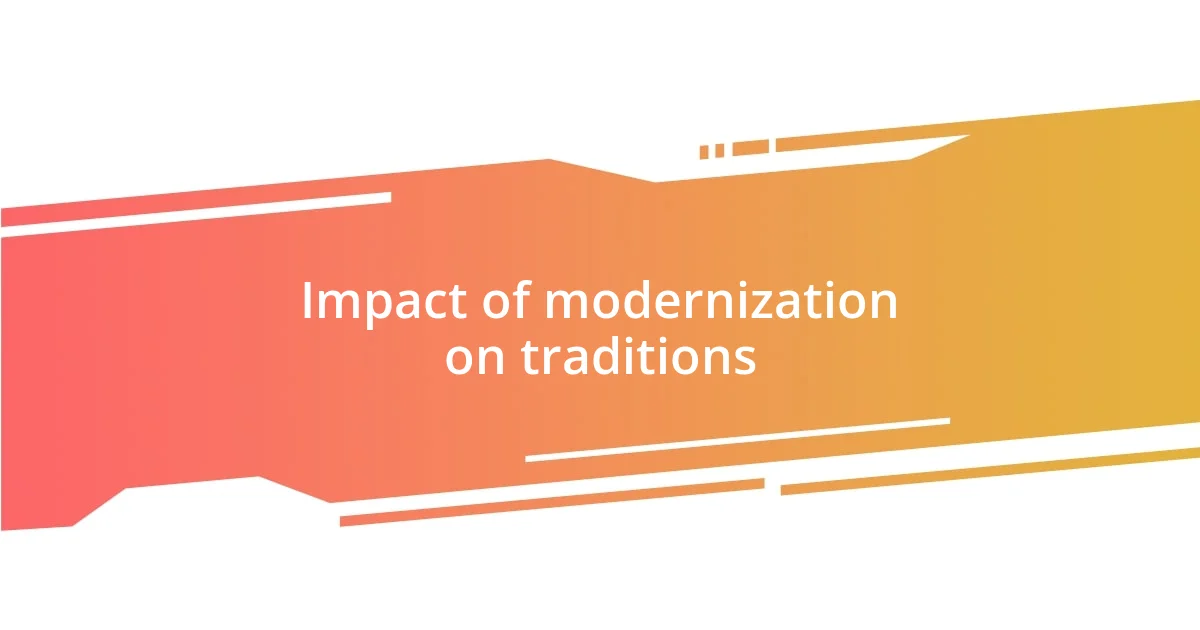
Impact of modernization on traditions
Modernization has undeniably had a profound impact on traditional practices, often leading to a gradual shift in how communities celebrate their heritage. I think back to a local harvest festival I attended; the once bustling market filled with handcrafted goods had transformed into a modern fair with commercial vendors. It’s disheartening to see how the soul of such events can be overshadowed by consumerism. Have you ever noticed that the things we cherish most become diluted when profit takes precedence over passion?
In many cases, traditional customs are now overshadowed by the fast-paced lifestyle we’ve adopted. I recall a traditional wedding ceremony I attended, which was once steeped in rich rituals passed down through generations. This time, however, many elements were compressed into a whirlwind of efficiency, reflecting society’s rush to embrace modern conveniences. How can we truly honor our roots while we’re so eager to leap into the future?
Additionally, I’ve witnessed a tendency for younger generations to gravitate towards digital forms of interaction, leaving cultural practices at risk of fading into obscurity. At a family reunion, my younger cousins opted for social media posts instead of participating in time-honored storytelling traditions that usually filled our gatherings with laughter and lessons. Isn’t it ironic that in our pursuit of connection through technology, we may be losing the personal touch that makes our experiences meaningful?

Ways to engage with traditions
Engaging with folk traditions doesn’t always require elaborate preparations; sometimes, it’s about embracing the simple moments. I remember when my neighbors invited me to a small berimbau lesson in their backyard. As I learned to play the instrument, the laughter and encouragement from the group made me realize that sharing these practices can create joy and connect us in unexpected ways. Have you experienced a moment when learning something new brought you closer to a community?
Another effective way to immerse yourself in traditions is by creating your own gatherings that honor past customs. For instance, I recently organized a potluck inspired by my grandmother’s recipes. As friends arrived, each dish came with a story, sparking a delightful exchange of cultural narratives. It made me appreciate how food can serve as a bridge, linking our experiences while preserving memories. Have you thought about how your meals could reflect your heritage and create bonding moments with loved ones?
Lastly, volunteering at local cultural events presents an opportunity to engage actively with traditions. I participated as a helper in a folk festival, and it was eye-opening. The behind-the-scenes work revealed the dedication and love that go into preserving these rituals. I found it rewarding to facilitate workshops where children learned about the art of traditional crafts. Isn’t it amazing how taking part in these experiences allows us to uphold traditions while nurturing future generations?
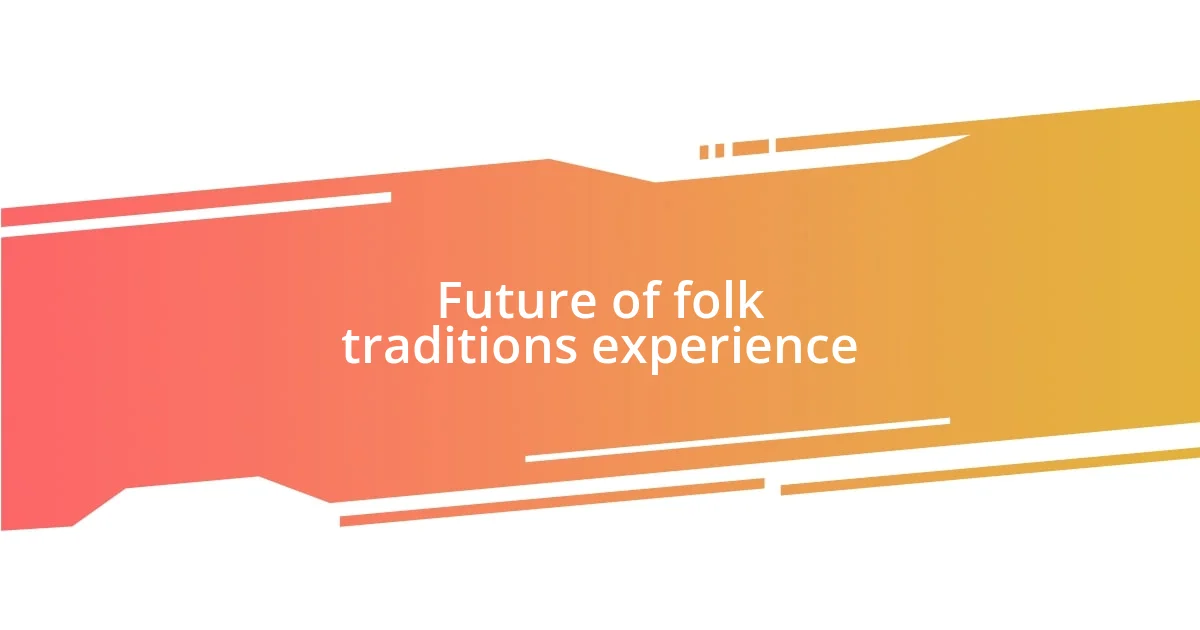
Future of folk traditions experience
As I ponder the future of folk traditions, I can’t help but feel a mix of hope and concern. Recently, I stumbled upon a community initiative where young artists fused traditional practices with contemporary art forms, creating a vibrant dialogue between the old and the new. Isn’t it fascinating how innovation can breathe new life into age-old customs while preserving their essence?
Looking ahead, I believe the key will lie in education and outreach. When I was part of a local cultural heritage program, I saw how workshops aimed at young children ignited a spark of curiosity about their roots. They crafted clay pots as their ancestors once did, giggling and sharing stories that made these traditions come alive. What if we could expand on that excitement, incorporating technology and interactive experiences to reach an even broader audience?
Furthermore, I marvel at the role social media plays in reviving folk traditions. I recall a charming online campaign showcasing various rituals from around the world, where communities shared their practices with pride. This digital sharing not only fosters a sense of belonging but also allows for a global appreciation of diverse heritages. Can you imagine a world where traditional festivals aren’t just local but celebrated universally?
